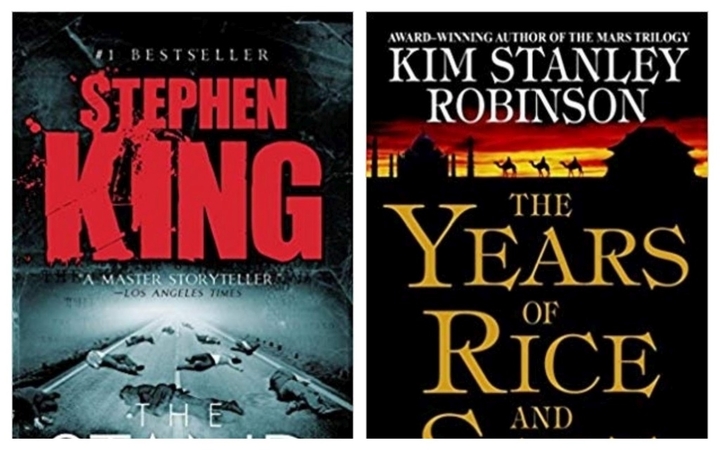Book World: Coronavirus feels like something out of a sci-fi novel. Here's how writers have imagined similar scenarios.

The coronavirus outbreak feels like something out of a science fiction — or horror — novel.
Indeed, novelists have been imagining scenarios like this for centuries. It was none other than the godmother of goth, Mary Shelley, who wrote one of the first plague novels. In "The Last Man" (1826), Shelley envisions a post-apocalyptic Earth ravaged by plague at the end of the 21st century. American survivors invade Europe, and humanity all but goes extinct. In the end, the "last man" is seen floating away from Britain in a small boat.
Pandemic novels, like pandemics, come and go in waves. The 60s had Michael Crichton's "The Andromeda Strain." The 70s saw the mega-success of Stephen King's "The Stand." Robin Cook gave us "Outbreak" in the 80s. By the 2000s, Max Brooks's "World War Z" and related "The Zombie Survival Guide" were deemed so plausible for emergency scenarios that Brooks now consults for the military. And in 2014, Emily St. John Mandel's "Station Eleven," about a deadly plague called the "Georgia Flu," dominated award lists and won widespread recognition.
With the coronavirus on everyone's minds, reading books about epidemics can either be a frightening turnoff or a fascinating "what if" thought experiment. For readers in the latter category, let's talk about books you might dare to consider.
---
Silvia: Although zombies are by now synonymous with pandemic, there are a number of novels that avoid this popular infection trope. Paul Tremblay's "Survivor Song" is out in July, and it's about a rabies-like virus with a short incubation period. When I talked to him at the Boskone convention, he told me his sister, a nurse, had helped him shape his ideas around how health services in Massachusetts might deal with such a scenario. Paul has been crowned "horror's newest big thing," so you might want to check him out if you haven't yet.
One of the best not-a-zombie pandemic books was "Pontypool Changes Everything." They say every Canadian novel is about either the weather or the harsh landscape, and this sparse book delivers both in spades, along with a virus that is transmitted via language and causes people to become cannibals. Yes, it's social satire and political commentary but also just a heck of a concept.
Lavie: I loved "Pontypool," the film adaptation of the novel. A language virus of course pops up earlier in Neal Stephenson's "Snow Crash," the book that effectively ends the Cyberpunk era. But the two novels couldn't be any more different. One novel I'd mention is Kim Stanley Robinson's epic "The Years of Rice and Salt." It takes the Black Death in the 14th century as its start, but imagines it has killed nearly everyone in Europe. How, then, does world history turn out different? Told over the intervening centuries, through a series of reincarnated characters, it imagines a Chinese Empire on the one hand, an Islamic world on the other, and an alliance of India and Native American nations all struggling for dominance. It's an enchanting, immersive book.
Silvia: I read "Snow Crash" as a teen and also loved Richard Matheson's "I Am Legend" (the lone dude trying to survive against the band of mutants each night!). I imagine younger folks today might turn to "Wilder Girls" by Rory Power — about teenagers quarantined at an isolated boarding school — rather than Matheson, for their horror kicks.
Lavie: My favorite plagues tend to be science fictional. Alastair Reynolds has a couple of great digital ones — the possibly-alien "melding plague" that takes down "Chasm City" in the eponymous novel, and the "nanocaust" that wipes out all human records in "Century Rain." Both are great noir-infused SF novels that couldn't be more different from each other.
They also raise an important point for the future of humanity: As we replicate the language of viruses, infections and rapid wide-scale distribution into our digital systems, are we becoming vulnerable to a new form of pandemic? And as we become ever more integrated with our own digital machines, do we place ourselves ever more at risk? Imagine when not only people, but houses, cars and even nuclear reactors can fall prey to malicious infection. It might sound like science fiction, but if you weren't worried enough, at least one military-grade computer worm, Stuxnet, hit Iran's nuclear program computers back in 2010. Fiction might be struggling to keep up.
Silvia: One of the most chilling science fictional plague books is "Clay's Ark" by Octavia Butler. Although technically part of a series, it can be read on its own. The story follows a family abducted by a group of people infected with an alien microbe that radically alters humans and pushes them to reproduce and spread their infection. The book starts like "Mad Max" and turns into "Species." Be warned: it comes with all the thorny issues of coercion that Butler liked exploring. Not a light read, but definitely a frightful one.
---
Moreno-Garcia is the author of the novels "Gods of Jade and Shadow," "Signal to Noise," and most recently, "Untamed Shore." Tidhar is the author of several novels, including "The Violent Century," "A Man Lies Dreaming," "Central Station" and "Unholy Land."





